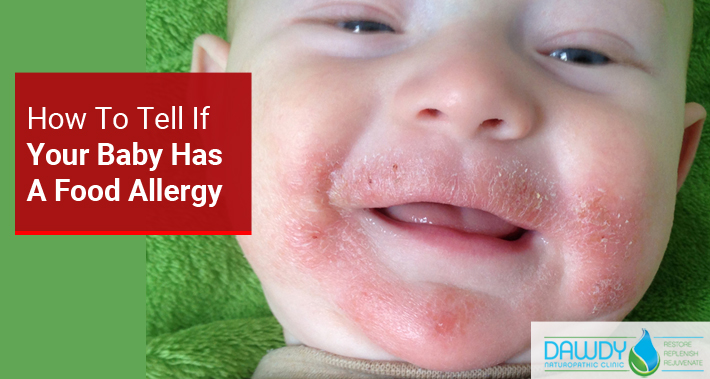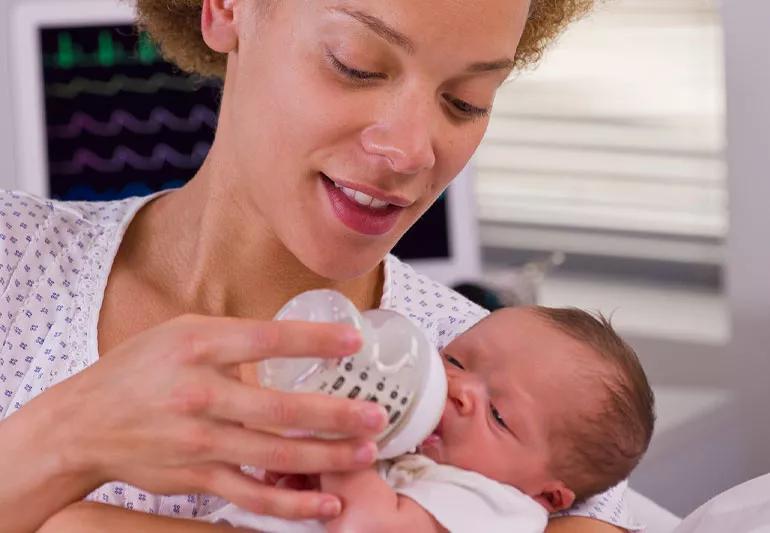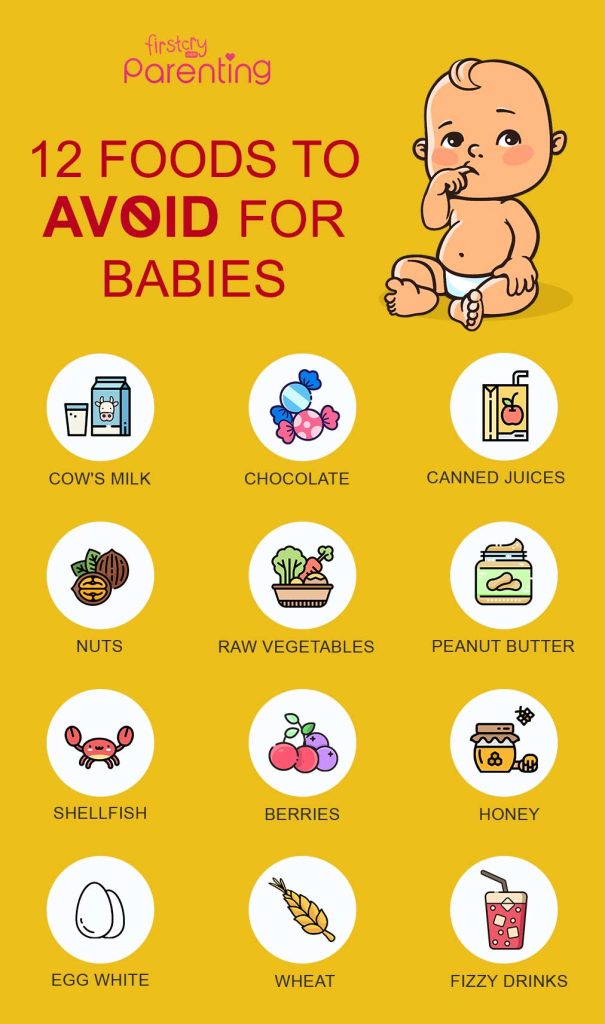Yes, babies can have food allergies. These allergies often show up when new foods are introduced to their diet.
Introducing solid foods to a baby’s diet can be an exciting milestone for parents. However, it’s essential to be aware of potential food allergies during this period. Common allergens include milk, eggs, peanuts, and soy. Symptoms of food allergies in babies can range from mild reactions like rashes to severe reactions such as difficulty breathing.
Early detection and management are crucial for the baby’s health. Consulting with a pediatrician before introducing new foods can help identify and prevent allergic reactions. Parents should observe their baby closely and seek medical advice if any allergic symptoms appear.

Credit: www.healthline.com
What Are Food Allergies?
Food allergies occur when the body’s immune system reacts to certain foods. This reaction can cause symptoms ranging from mild to severe. Babies can also have food allergies. Understanding food allergies helps in managing them effectively.
Definition
A food allergy is an immune system response to a food protein. The body mistakenly identifies the protein as harmful. This triggers an allergic reaction. Symptoms can include hives, swelling, and difficulty breathing.
Common Allergens
Many foods can cause allergic reactions in babies. Here are some common allergens:
- Milk
- Eggs
- Peanuts
- Tree Nuts
- Fish
- Shellfish
- Wheat
- Soy
Knowing these common allergens can help parents be vigilant. Keeping these foods away from allergic babies is crucial.
Recognizing food allergies early can prevent serious health issues. Always consult a pediatrician for proper diagnosis and treatment.

Credit: huckleberrycare.com
Symptoms In Babies
Babies can have food allergies, and the symptoms can vary widely. It’s crucial for parents to recognize these symptoms early to seek proper medical advice. Below are some common symptoms in babies.
Visible Signs
Some symptoms are visible and can be easily noticed:
- Rashes: Red patches or hives on the skin.
- Swelling: Puffiness around eyes, lips, or face.
- Vomiting: Frequent throwing up after eating.
- Diarrhea: Loose or watery stools.
Behavioral Changes
Other symptoms might be behavioral and less obvious:
- Fussiness: Baby seems irritable or uncomfortable.
- Refusal to eat: Baby refuses food or milk.
- Sleep disturbances: Baby has trouble sleeping or wakes up often.
- Excessive crying: Baby cries more than usual.
Recognizing these symptoms can help in identifying food allergies in babies. Consult a pediatrician if any of these signs are observed.
Risk Factors
Babies can develop food allergies due to various risk factors. Understanding these factors helps in better prevention and management. Let’s explore the major risk factors under two main categories.
Genetic Factors
Genetic factors play a significant role in food allergies. If one or both parents have allergies, the baby has a higher risk. This includes not just food allergies but also other types like hay fever or eczema. A family history of asthma can also increase the likelihood.
| Parent Allergies | Risk for Baby |
|---|---|
| One Parent | 20-40% |
| Both Parents | 50-80% |
Environmental Influences
Environmental factors also contribute to the development of food allergies in babies. Early exposure to allergens can increase the risk. Babies born via C-section may have altered gut bacteria, affecting their immune system. Pollution and tobacco smoke are other risk factors. Breastfeeding practices also matter. Exclusive breastfeeding for the first six months can lower the risk.
- Early exposure to allergens
- Birth method (C-section)
- Pollution and tobacco smoke
- Breastfeeding practices
These factors interact in complex ways. Knowing them can help in making informed decisions for your baby’s health.
Diagnosing Food Allergies
Babies can have food allergies, and early diagnosis is crucial. Diagnosing food allergies in infants involves several methods. These methods help identify the allergens causing reactions. This section will explore the main methods used to diagnose food allergies in babies.
Medical Tests
Medical tests are essential for diagnosing food allergies. Common tests include:
- Skin Prick Test: A small amount of allergen is placed on the skin. If a bump appears, it indicates an allergy.
- Blood Test: This measures the level of specific antibodies. High levels suggest an allergy.
- Oral Food Challenge: The baby eats small amounts of the suspected allergen. This test is conducted under medical supervision.
Observation Methods
Observation methods involve monitoring the baby’s reactions. Parents and doctors look for symptoms after the baby eats certain foods.
Key observation methods include:
- Food Diary: Parents record what the baby eats and any symptoms. This helps identify patterns.
- Elimination Diet: Remove suspected allergens from the baby’s diet. Gradually reintroduce them to see if symptoms return.
- Symptom Monitoring: Watch for signs like rashes, vomiting, or breathing issues. Note the timing and severity of symptoms.
Using these methods, doctors can accurately diagnose food allergies in babies. Early diagnosis ensures proper management and a healthier life for your baby.
Managing Allergies
Managing food allergies in babies can be challenging but essential. Early recognition and timely intervention can make a big difference. Here, we discuss some effective strategies for managing allergies in babies.
Dietary Adjustments
Identifying and eliminating the allergenic food from your baby’s diet is crucial. Common allergens include peanuts, dairy, and eggs. A healthcare provider can guide you.
- Introduce new foods one at a time.
- Keep a food diary to track reactions.
- Read food labels carefully to avoid hidden allergens.
Breastfeeding mothers should also consider their own diets. Some allergens can pass through breast milk. Consult your doctor for tailored advice.
Emergency Plans
Having an emergency plan can be life-saving. Learn to recognize severe allergic reactions like anaphylaxis.
| Symptom | Action |
|---|---|
| Swelling of the face or lips | Call emergency services immediately |
| Difficulty breathing | Use an epinephrine injector if available |
| Hives or rash | Seek medical attention |
Always have an epinephrine auto-injector on hand if your baby has a known severe allergy.
Inform caregivers and family members about your baby’s allergies. Make sure they know how to respond in an emergency.
Preventive Measures
Preventing food allergies in babies is crucial for their health and well-being. Parents can take several steps to reduce the risk of food allergies. Below are some effective preventive measures.
Early Introduction
Introducing potential allergens early can help build tolerance. Start with small amounts of common allergens like peanuts, eggs, and dairy. Make sure to introduce one new food at a time. Wait a few days before introducing another new food. This helps identify any allergic reactions. Consult your pediatrician before starting this process. Use this method for babies over six months old.
Breastfeeding Benefits
Breastfeeding offers many benefits, including reducing the risk of allergies. Breast milk provides essential nutrients and antibodies. These help strengthen the baby’s immune system. Exclusive breastfeeding for the first six months is recommended. It helps in building a strong foundation for the baby’s health.
| Step | Action |
|---|---|
| 1 | Introduce potential allergens early |
| 2 | Start with small amounts |
| 3 | Introduce one new food at a time |
| 4 | Wait a few days before introducing another |
| 5 | Consult your pediatrician |
| 6 | Breastfeed exclusively for six months |
- Start early to build tolerance.
- Breastfeed to provide essential nutrients.
- Introduce one new food at a time.
- Consult your pediatrician for guidance.
- Introduce allergens early.
- Breastfeed exclusively for six months.
When To See A Doctor
Babies can show signs of food allergies early on. It’s crucial to know when to see a doctor. Parents should be aware of specific symptoms that require immediate medical attention.
Warning Signs
Watch for these warning signs of food allergies in your baby:
- Rashes or hives
- Swelling of the face, lips, or tongue
- Vomiting or diarrhea
- Breathing difficulties
- Extreme fussiness or crying
If your baby shows these symptoms, it’s essential to act quickly. Some reactions can be severe and need urgent care.
Professional Advice
Consult a doctor if your baby shows signs of a food allergy. A doctor can perform tests to confirm the allergy. They might recommend seeing an allergist for specialized care.
Follow the doctor’s advice on how to introduce new foods. Keep a food diary to track your baby’s reactions. This helps in identifying the allergen.
| Symptom | Action |
|---|---|
| Rashes or hives | Call your doctor |
| Swelling | Seek immediate care |
| Vomiting | Monitor and call doctor |
| Breathing issues | Emergency care |
| Extreme fussiness | Discuss with your doctor |
Remember to keep emergency contact numbers handy. Always have a plan for unexpected allergic reactions.
Living With Food Allergies
Living with food allergies can be challenging, especially for babies. Parents must stay vigilant to keep their little ones safe. Below, we explore daily tips and support systems to help manage food allergies effectively.
Daily Tips
- Read Labels Carefully: Always check food labels for allergens. Ingredients can change without notice.
- Prepare Meals at Home: Homemade meals ensure you control the ingredients. Avoid processed foods as they often contain hidden allergens.
- Educate Caregivers: Inform anyone caring for your baby about their allergies. Provide them with an emergency action plan.
- Safe Snacks: Carry safe snacks wherever you go. This reduces the risk of accidental exposure.
- Clean Environment: Keep your baby’s environment clean. Wipe surfaces to remove potential allergens.
Support Systems
Support systems play a crucial role in managing food allergies. Here are some valuable resources:
| Resource | Description |
|---|---|
| Allergy Support Groups | Connect with other parents facing similar challenges. Share experiences and tips. |
| Medical Professionals | Consult allergists and pediatricians regularly. They provide medical advice and updates on allergy management. |
| Online Communities | Join online forums and social media groups. These platforms offer support and information. |
| Emergency Contacts | Keep a list of emergency contacts. Include doctors, hospitals, and local emergency services. |
Living with food allergies demands attention and support. By following daily tips and leveraging support systems, you can ensure your baby’s safety and well-being.

Credit: dawdynaturopathicclinic.com
Frequently Asked Questions
How Do You Know If Your Baby Has A Food Allergy?
Your baby may have a food allergy if they show symptoms like hives, swelling, vomiting, or diarrhea after eating. Consult a pediatrician for a proper diagnosis.
At What Age Do Food Allergies Develop?
Food allergies can develop at any age. They are most common in children under three years old.
What Are The Common Food Sensitivities In Babies?
Common food sensitivities in babies include dairy, eggs, nuts, soy, wheat, fish, and shellfish. Symptoms may involve rashes, diarrhea, or vomiting.
What Are Allergen Foods For Babies?
Common allergen foods for babies include eggs, peanuts, tree nuts, cow’s milk, soy, wheat, fish, and shellfish. Introducing these foods should be done carefully and gradually, preferably under pediatric guidance.
Conclusion
Recognizing food allergies in babies is crucial for their health and well-being. Early identification helps prevent severe reactions. Consult your pediatrician for guidance on introducing new foods safely. By staying informed, parents can ensure their baby’s diet is safe and nutritious.
Always prioritize your baby’s health by being vigilant and proactive.


